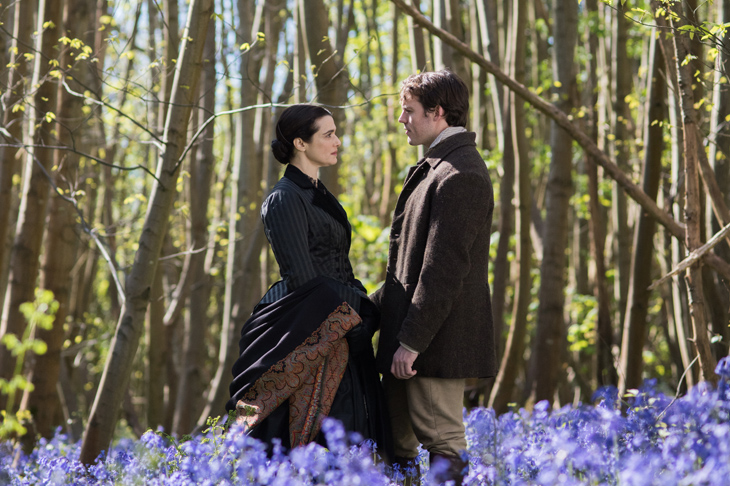My Cousin Rachel is an adaptation of Daphne du Maurier’s mystery-romance and, even though it stars the forever wonderful Rachel Weisz, it’s more sedate than suspenseful, more tasteful than dangerous. This should be a creepy, gripping tale of paranoia, deception, lust, and suspicions that are founded, unfounded, founded, then unfounded again. (There is a great deal of founding and unfounding on the suspicion front.) But the high-end, glossy period trappings — the frocks; the stately mansions; the teal drawing rooms; the horses galloping along scenic cliff paths; that wisteria — don’t play into a dark, gothic atmosphere. It is highly watchable, I have to say, but it won’t have you biting your nails to the quick, as it should.
The novel, first published in 1951, was a sensation at the time and kept having to be reprinted. (Victor Gollancz was ecstatic when he initially received the manuscript, recognising that this was du Maurier ‘bang on form’.) Like Rebecca, published 13 years earlier, its focus is the toxicity of jealousy, but this time round it’s male jealousy rather than female jealousy, so it’s a toxicity that extends to the control men expect to have over women. This may even be the real murderer here.
The setting is Cornwall and, inevitably, waves crash endlessly against the rocky coast. (I kept expecting Poldark to truck up.) This is where Philip (Sam Claflin), an orphan, has grown up as the son and heir of his beloved older cousin, Ambrose. Theirs has not been a woman-friendly household, Philip tells us, in voice-over. In fact, the only females that have ever been allowed in are ‘the dogs’. But Ambrose must take a trip to Italy, for health reasons, and there, much to everyone’s surprise, he falls in love with Rachel (Weisz), a distant cousin — along with all the founding and unfounding, there is also a great deal of cousin action going on — and marries her. However, soon after the wedding his letters home say, in effect: ‘Help. She’s poisoning me. Come rescue me. Quick.’ Philip races to Florence but it’s too late. Ambrose is dead and Rachel is nowhere to be seen. Did she? Or didn’t she? Bump him off? Or did Ambrose suffer from a brain tumour, which made him go crazy prior to his death, as the post-mortem says?
Philip is certain that she is a killer. Philip calls her ‘that bitch’. But the moment she turns up at his estate in Cornwall — she has inherited nothing; Ambrose made a new will but never signed it — he throws his misogyny to the wind and becomes infatuated. (Actually, he may become misogynistically infatuated, as he never sees Rachel as a human being, but I accept that may be a discussion for another day.)
His godfather (Iain Glen) is alarmed, as is his daughter, Louise (a scene-stealing Holliday Grainger), who loves Philip, but he’s always been too much of a chump to see it. The narrative should have him (and us) flip-flopping between thinking that Rachel is an angel, no devil, no angel, no devil. That Italian fella she’s seeing. Is he her lover? That tisane she keeps making Philip. Is it just herbal tea or something more sinister? From my memory of the novel — we all read it as teenage girls; there was no teenage fiction back then so you went straight from Ballet Shoes to du Maurier prior to, of course, discovering Harold Robbins, who blew our tiny minds — this should be a white-knuckle ride, but much of the erotic intensity seems washed out here.
As written and directed by Roger Michell, the film is a rather drawn out, inert affair, as we repair to drawing rooms, or to church, or to take tea with the vicar, amid all the high-end trappings and that obligatory painterly light streaming through windows. The forever wonderful Weisz is transfixing and does deliver a delicious ambivalence while encapsulating the position of women at that time, who were denied wealth and power because men feared them having it. As for Claflin, hard to say. He plays Philip as a sulky, shallow schoolboy — he got on my nerves; he’ll get on yours — but as Philip is meant to be a sulky, shallow schoolboy, it seems unfair to blame him for it. The film shows him shirtless quite often, so we can see he’s a strapping lad, but it isn’t enough to ratchet up the sexual chemistry to anything much above wan.
Still, it is highly watchable, and remember: what God takes away with one hand he gives with the other. No, it isn’t sufficiently dark, twisted or tense, but the bonnets and the wisteria are lovely. Truly.
Got something to add? Join the discussion and comment below.
Get 10 issues for just $10
Subscribe to The Spectator Australia today for the next 10 magazine issues, plus full online access, for just $10.
You might disagree with half of it, but you’ll enjoy reading all of it. Try your first month for free, then just $2 a week for the remainder of your first year.













